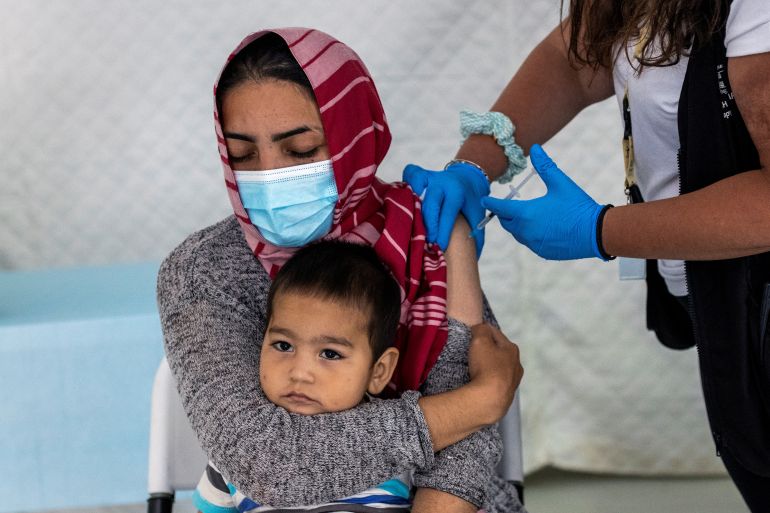Greece rolls out ‘long-awaited’ mass vaccine campaign to refugees
Effort to inoculate refugees on islands comes months after first shots were delivered to wider population.

Lesbos, Greece – Greece is launching a mass vaccination campaign for refugees, months after the first shots were rolled out to the wider population in early January.
Starting Thursday, vaccinations will be offered to people living in refugee camps on the islands of Lesbos, Chios and Samos.
Keep reading
list of 4 itemsIndian doctors fighting COVID ‘overworked, stressed, frightened’
G7 ministers to discuss COVID vaccines, animal-borne diseases
Brazilians bang pots in protest as 2,500 more die of COVID-19
Those on the remaining island camps and the mainland will be offered the shots next week.
Athens plans to inoculate more than 11,000 people living in refugee camps on the Greek islands against the coronavirus. According to the UNHCR, there are 91,945 recognised refugees in the country.
More than five million first shots have been administered across Greece, which has a population of approximately 10.7 million people.
The single-shot vaccine produced by Johnson & Johnson will be used, with staff from the Hellenic National Public Health Organisation (EODY) responsible for administering the jabs.
Stephan Oberreit, head of Greece’s Doctors Without Borders (MSF) mission, told Al Jazeera: “The vaccination of refugees and asylum seekers residing on the Greek islands against COVID-19 has been long-awaited.
“We have been urging the Greek authorities to include this population in every step of the fight against COVID-19, so the vaccination is a very positive step.
“MSF on Lesbos, in coordination with other medical actors and the national public health organisation, will be participating in the health promotion campaign taking place in Kara Tepe camp in the next few weeks.”
Concerns over vaccine hesitancy
According to officials, only about 15 percent of asylum seekers living in Greece have expressed interest in receiving the vaccine.
Regarding concerns over possible vaccine hesitancy, Manos Logothetis, the head of Reception of Asylum Seekers at the migration and asylum ministry, said he believes the uptake rate will grow when the campaign gets under way.
“They have shown interest, while many have acquired immunity because they tested positive for the coronavirus. Most were asymptomatic,” he said.
“As soon as the vaccination starts, as it did in the general population, these trends will increase.”
Abdul*, a 20-year-old refugee from Afghanistan who has been living on Lesbos for nearly two years, said he was worried about getting the vaccine but would still take it.
“I don’t feel good [about it] and also my friends don’t feel good but we have to be vaccinated,” he told Al Jazeera.
Lockdown restrictions eased
Greece started relaxing strict lockdown restrictions on May 14 as it began opening up for the tourist season.
But rights groups had criticised the government for opening up to visitors while keeping refugee camps in the country under lockdown.
The country, which saw relatively few cases and deaths at the outset of the pandemic, has struggled with subsequent waves and there has been a rush to vaccinate island residents before the summer months.
On Lesbos, vaccines for the local population are in full swing; more than 35,000 doses have been administered to date.
More than 6,000 people live in the main refugee camp on Lesbos island, which was hastily erected in the wake of a fire that burned most of the previous Moria camp to the ground last September.
Cases on Lesbos have spiked recently, with 541 infections recorded in May, 227 of which were among camp residents, according to local news.
* Names have been changed